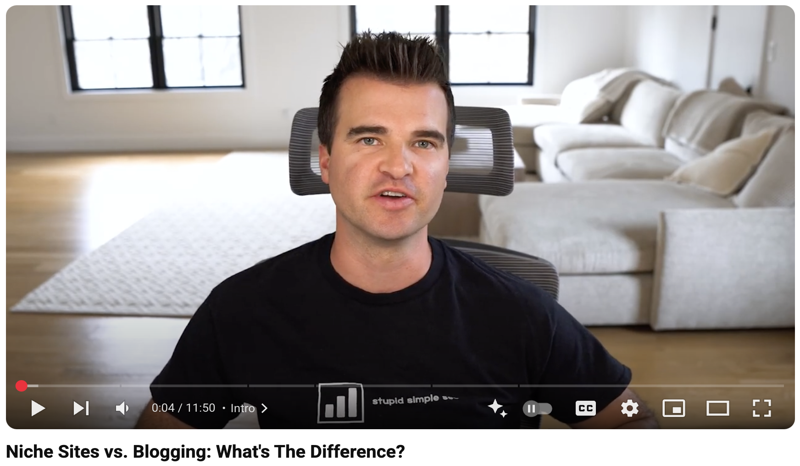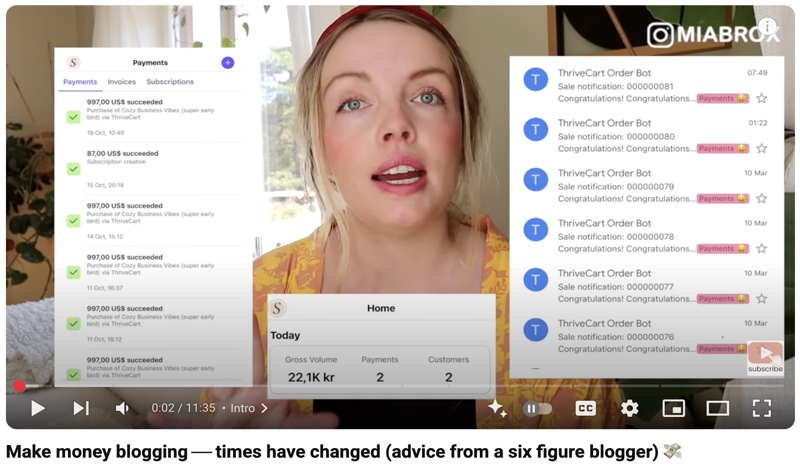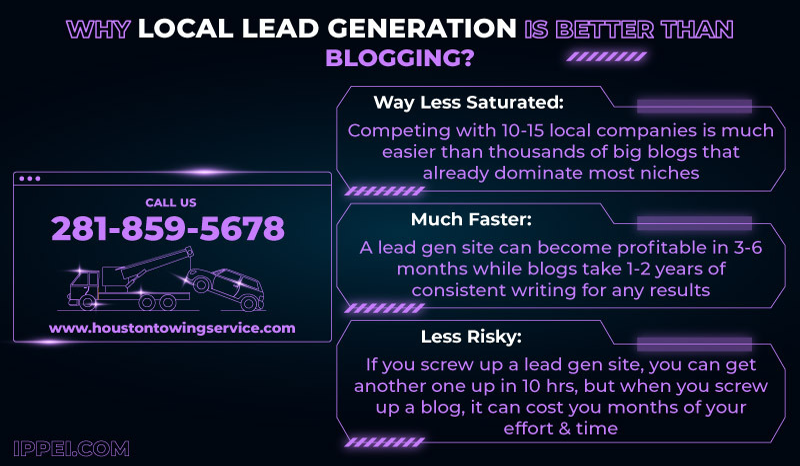13 Reasons Blogging Isn't Dead in 2025 - Monetization, Marketing Power, & Search Relevance

The reasons blogging isn’t dead in 2025 are:
- 45% of bloggers make over $50K a year
- Brands that blog get 13x more ROI than those that don’t
- Blogs generate 67% more leads per month
- 83% of consumers trust blogs for product recommendations
- 46% of Google searches are for local businesses, and blogs boost their visibility
- Blog commenters are 7x more loyal than social media users
- Google is still the #1 search engine and so keeps blogs alive
- 61% of readers choose blogs to learn something new or solve a specific problem
Blogging is alive in 2025 because of its readership and benefits for businesses. Social Media Today reports that 77% of internet users still read blogs. MasterBlogging adds that 83% engage with blog posts. With 5.35 billion regular internet users, there are 4.44 billion blog readers. This immense audience shows that blogs continue to be a primary source of:
- credible information
- educational content
- entertainment
Also, blogging significantly enhances website performance, drives customer engagement, and boosts conversions. BKA Content says that active blogs boost visibility on search engines. They get 434% more indexed pages and 97% more inbound links, which boost their online authority and credibility. DemandMetric adds that businesses with blogs get 67% more monthly leads than those without.
Some people think blogging is dead because making money from it takes time. A survey by Eb Gargano shows that most bloggers earn just over $1,000 per month after one year. After three years, they earn about $2,200 monthly, and by five years, this grows to $4,000. This slow growth makes some lose interest. Another problem is the rise of AI-generated content. Many blogs now have AI-written articles. They often lack a personal voice and originality. Orbit Media reveals that 80% of bloggers are already using AI. Readers may skip these blogs because they feel generic and less engaging.
Hrishikesh Roy says that AI and changes in content consumption are bloggers’ biggest challenges in 2025. AI tools like chatbots now give quick answers. So, fewer people visit blogs via search engines. Plus, AI-generated content has filled search results, pushing human-written blogs aside. Roy also notes that most readers prefer short videos to long blogs. It is harder for blogs to hold their attention. Monetization is another issue.

A Reddit post argues that social media’s focus on short, personal posts stifles creativity and expression. After MySpace faded, people missed personal websites. So long-form content is still valuable. In fact, a blog can even boost an online store and sell products or downloads.

Blogging is not dead, but making money from it is not easy. I have been running one of the largest blogs in the digital marketing niche for over 10 years. In this article, I go over the 13 reasons why blogging isn’t dead. I also discuss different monetization opportunities and why some say blogs are no longer valuable in 2025.
1. 45% of Bloggers Make Over $50K a Year
Blogging stays relevant because there are many ways to make money. The blog economy is huge. There are over 600 million blogs worldwide, according to Statista. Unlike earlier eras, where ads were the primary income, today’s bloggers have multiple revenue streams available. Common monetization methods include:
- Affiliate marketing. Bloggers promote products and earn a commission when someone buys through their link. Many bloggers make thousands of dollars each month this way.
- Ads on blogs. Google AdSense and Mediavine let bloggers earn money by displaying ads. SimilarWebs says that About 45% of bloggers use ads to earn money. More traffic means higher earnings.
- Selling digital products. Many bloggers sell e-books, courses, or memberships. HubSpot reveals that 45% of bloggers making over $50,000 a year sell their products.
- Sponsored posts. Brands pay bloggers to write about their products. Influencer Marketing Hub states that around 25% of bloggers make money through sponsored posts. Big brands work with bloggers to reach more people.
2. Brands That Blog Get 13x More ROI Than Those That Don’t
Blogging remains a cost-effective way to build and promote brands in 2025. It allows businesses to establish a strong online presence, share their values, and connect with their audience without the high costs of traditional advertising. According to HubSpot, brands that prioritize blogging get 13 times more ROI than those that don’t. Additionally, 56% of marketers using blogs say they are effective, with 10% claiming blogging provides the best ROI. To make the most of blogging as a branding tool:
- Optimize for SEO. Use Google Keyword Planner and Yoast SEO to ensure your blog ranks well. Include high-value keywords, meta descriptions, and backlinks in your posts.
- Promote through social media. Share blog posts on platforms like LinkedIn, Twitter, and Instagram to increase visibility. Use scheduling tools like Buffer or Hootsuite to stay consistent.
- Engage your audience. Respond to comments and questions on your blog to build a loyal community. Include calls-to-action (CTAs) that guide readers to subscribe or share.
- Repurpose content. To reach a wider audience, turn blog posts into videos, infographics, or podcasts. Use Canva or Lumen5 to simplify the repurposing process.
3. Blogs Generate 67% More Leads per Month
Blogs generate leads and drive conversions effectively. They attract organic traffic, educate potential customers, and build trust. According to HubSpot, businesses that blog generate 67% more leads per month than those that don’t. Blogs also help nurture leads by providing content that answers common questions and solves problems. Well-optimized blog posts rank on Google, bringing in consistent traffic. According to DemandMetric, 70% of consumers prefer learning about a company through articles instead of ads.
Lead magnets like eBooks, checklists, and exclusive guides work well in blog posts. You can add CTA buttons, email sign-up forms, and pop-ups to convert readers into leads. According to OptinMonster, personalized CTA buttons convert 202% better than generic ones. Blogs also boost conversions by guiding leads toward making a purchase. With the right content strategy, blogs turn traffic into leads and leads into customers.
4. 83% of Consumers Trust Blogs for Product Recommendations
People still read blogs because they provide product info that many other online platforms lack. Unlike the fast, shallow content on social media, blogs explore specific topics in depth. They provide analysis, tutorials, and unbiased reviews. A report by Master Blogging says that 83% of consumers trust blogs for product recommendations.
A study by OptinMonster found that 62.96% of readers trust blogs with multiple authors more. They reflect diverse viewpoints and specialized knowledge. Blogs are a go-to source for reliable, well-researched info. To build trust and attract readers seeking credible information:
- Collaborate with experts and many authors. Invite guest authors or collaborate with specialists to add credibility to your blog. Highlight the authors’ expertise in their bios.
- Publish well-researched content. Use verified sources, data, and case studies to back up your claims. Include links to reputable sites and peer-reviewed articles.
- Create evergreen and niche content. Focus on topics that stay relevant over time or address specific industry needs. Update posts to keep information current and accurate.
- Focus on transparency. Disclose any partnerships, sponsored content, or affiliations in your posts. Use a conversational yet professional tone to build reader trust.
5. 46% of Google Searches Are for Local Businesses and Blogs Boost Their Visibility
Blogging supports small, local businesses in building visibility and credibility. According to WebFX, 46% of Google searches have local intent. Blogs help businesses rank higher in local searches, and their location-specific content attracts nearby customers looking for products or services. BrightLocal found that 68% of respondents believe all local businesses need a blog. A blog is important in connecting with local audiences, and it helps businesses show expertise, improve SEO, and rank for relevant keywords. To maximize the impact of blogging for small, local businesses:
- Focus on location-specific content. Write about community events, local trends, and collaborations with nearby businesses. Use geo-specific keywords like “in [city]” or “near [landmark].”
- Create “Best Of” and “How-To” content. Write posts like “Top 5 [Services] in [City]” to target local search queries. Provide step-by-step guides that address common customer needs.
- Engage with your audience. Encourage local customers to comment on your blog and share their experiences. Share blog posts on community Facebook groups or local forums.
- Promote seasonal and event-based content. Highlight upcoming holidays or events with promotions and blog coverage. Write about how your business supports local causes or charities.
7. Google Is Still the #1 Search Engine and So Keeps Blogs Alive
Google is still the most used search engine in 2025. It processes over 9.5 million searches every minute. This huge daily traffic creates endless chances for blogs. They attract readers by addressing the needs of billions of users. People often seek how-to guides, product comparisons, and expert insights. Blogs are a top source of detailed, trustworthy info. BrightEdge says organic search drives over 53% of website traffic, and blogs are a big part of this. To tap into the billions of daily searches on Google through your blog:
- Write content for high-traffic keywords. Use Google Keyword Planner or Ahrefs. Find high-volume keywords for your niche. Create content that matches user search intent.
- Produce evergreen content. Write timeless articles, like how-to guides and industry trend pieces. Update existing posts regularly to maintain their ranking.
- Optimize for mobile search. Make your blog mobile-friendly. According to StatCounter, over 63% of searches are from mobile devices. Use responsive design and fast-loading pages.
- Engage with local SEO. Target location-based keywords to capture local traffic. Register your blog on Google My Business for more visibility.
8. 61% of Readers Choose Blogs to Learn Something New or Solve a Specific Problem
Educational content meets the increasing need for accessible, reliable information. People frequently turn to blogs for how-to guides, in-depth analyses, and step-by-step instructions. A HubSpot survey found that 61% of readers were drawn to recent blogs to learn something new or solve specific problems. Blogs are searchable, practical sources on topics like finance, tech, health, and DIY. So, it is a better source for detailed learning. To leverage educational content for a successful blog:
- Provide step-by-step tutorials. Create guides for solving specific problems. For example, “How to Master Algebra in 30 Days” or “Beginner’s Guide to Coding.” Include actionable steps and real-life examples for clarity.
- Specialize in a niche. Focus on high-demand educational areas. These include test prep (e.g., SAT, GRE), career skills (e.g., resumes, LinkedIn), and e-learning.
- Create downloadable study resources. Offer value-packed PDFs like study guides, cheat sheets, or printable lesson plans. For example, a “Weekly Language Learning Plan” could grow your email list.
- Turn educational content into products. Convert popular blog topics into paid eBooks or online courses. A blog series on “Basic Financial Literacy” could become a course on Teachable or Udemy.
9. Blogs Increase Website Traffic by up to 434%
Blogs drive traffic by attracting readers who seek in-depth content. Unlike social media, where interactions are short-lived, blogs encourage users to explore and spend more time on your site. According to TechJury, adding a blog to a website can boost traffic by up to 434%.
Quality blog posts with valuable insights, tips, or stories keep readers engaged and lead to more shares, comments, and repeat visits. In 2025, blogging remains a powerful strategy for driving long-term, organic traffic. To maximize traffic through blogging: To maximize engagement through blogging:
- Encourage interaction. End posts with questions or prompts to encourage comments. Respond promptly to reader comments to build a sense of community.
- Add interactive elements. Use polls, quizzes, or surveys to make content more engaging. Incorporate multimedia elements like videos, infographics, and GIFs.
- Leverage data-driven headlines and formats. Write compelling headlines using tools like CoSchedule’s Headline Analyzer. Use listicles, how-to guides, and case studies, which are proven to drive higher engagement.
- Promote content across channels. Share blog posts on social media, email newsletters, and forums. Use Buffer or Hootsuite to maintain a consistent posting schedule.
10. Long-Form Content Ranks High on Google
Long-form content helps blogs stay relevant by offering depth, SEO benefits, and engagement. Readers searching for detailed answers prefer blog posts over short content. According to Backlinko, the average first-page Google result contains around 1,447 words. Longer content ranks higher. Also, HubSpot found that posts over 2,000 words receive more backlinks, boosting SEO. Long content naturally covers more keywords, making it easier to appear in search results.
Longer blog posts also increase engagement and shares. Medium users spend millions of hours reading their blogs each month. It proves that people still prefer valuable, well-researched content. Short-form content is useful for quick updates, but long-form blogs provide authority, trust, and value. WordPress and Medium show that long-form content will still be in demand in 2025.
- WordPress remains the world’s most popular blogging platform, powering 43% of all websites (Kinsta). SiegeMedia states that tens of millions of new blog posts go live every month. Many of them are guides and research-based content. Businesses and creators continue to invest in longer, more valuable posts instead of short snippets.
- Medium has grown into a hub for long-form reading, attracting 100 million monthly readers (TechJury). Popular articles often range from 5 to 10 minutes in reading time. It covers in-depth topics in tech, business, and self-improvement.
11. Google’s Algorithm Favors High-Quality Blogs
Google’s algorithm updates favor high-quality, relevant, user-friendly blogs. It’s focus on intent-driven content and its RankBrain and BERT algorithms boost blogs. 2025 changes further promoted blogs by using AI algorithms, Rich Snippets, and the Helpful Content Update. So, well-crafted blogs are still highly discoverable.
A 2025 BrightEdge study found that organic search drives web traffic. It generates over 55% of website visits, with blogs making up a large share. To maximize the benefits of Google’s advancements:
- Target high-intent queries. Use AnswerThePublic or SEMRush to identify common questions your audience searches for. Create posts that directly address these queries.
- Optimize for rich snippets and featured snippets. Format content with clear headings, bullet points, and concise answers. Use schema markup to help Google identify your content for rich results.
- Focus on E-E-A-T (Experience, Expertise, Authoritativeness, Trustworthiness). Include detailed author bios to establish credibility. Use data, case studies, and links to reputable sources to support your points.
- Leverage Google Discover. Create evergreen and trending content optimized for mobile devices. Add interesting visuals and headlines to attract clicks.
12. 67% of Consumers Trust Niche Blogs
According to DemandSage, 67% of consumers trust niche blogs and websites when making buying decisions. This trust leads to higher engagement and more returning visitors. By writing high-quality content on a specific topic, niche bloggers can rank higher and get more readers. Not all niches are equal. Some make more money and get higher traffic than others.
Search engines also favor niche blogs. According to GrowthBadger, 72% of successful bloggers say choosing a niche is a major factor in their success. A blog with clear, targeted content performs better in Google rankings. According to WPBeginner, these are some of the top-earning blogging niches:
- Food blogs. 42.8% of food blogs get over 50,000 monthly visitors. Food blogs earn about $9,169 per month. Popular content includes recipes, cooking tips, and kitchen product reviews.
- Lifestyle and parenting blogs. 13.3% of lifestyle blogs exceed 50,000 monthly visitors, making around $5,174 per month. Parenting blogs within this niche also perform well. Topics include family life, self-care, and home organization.
- Travel blogs. 10% of travel blogs reach 50,000 visitors per month. Travel bloggers earn an average income of $5,000 per month. Travel blogs do well with destination guides, hotel reviews, and itineraries.
- Personal finance blogs. Finance blogs earn about $9,100 per month, almost as much as food blogs. Topics include investing, saving, and budgeting.
13. 83% of Internet Users Read Blogs
Blogs connect creators to audiences worldwide. This flexibility lets blogs bypass physical, cultural, and tech barriers. MasterBlogging says 83% of internet users read blogs, which is 4.44 billion readers worldwide. Blogs thrive because they cover many topics and languages. They meet the needs of people in different regions. Their 24/7 availability allows anyone in any time zone to access the content. To maximize the benefits of blogging’s global reach and accessibility:
- Ensure mobile responsiveness. Use tools like Google Mobile-Friendly Test to optimize your blog for mobile devices.
- Provide offline access. Use Pocket or Instapaper to enable readers to save and access content offline.
- Incorporate multilingual support. Add translation plugins like WPML or Weglot to reach readers in other languages.
- Enable easy sharing. Add social sharing buttons to encourage readers to share your content on WhatsApp, Facebook, and LinkedIn.
Why Experts Say Blogging is Dead in 2025
- Short videos are taking over. Platforms like TikTok, Instagram Reels, and YouTube Shorts have made video content quick, engaging, and easy to share. Vidico reports that video now makes up 90% of all internet traffic, and businesses are shifting their focus. Over half now create videos under two minutes. Saleslion even found that videos can boost sales by up to 80%. As a result, traditional blogs struggle to compete for attention.
- Too many blogs make it hard to get noticed. MasterBlogging states there are over 600 million blogs, producing 7.5 million posts every day. Search engines prioritize well-established sites. Newer bloggers struggling to get noticed.
- AI content is crowding the blogging industry. Statista reports that 42% of writers now use AI tools regularly, and Orbit Media says AI-powered blogging jumped from almost 0% in 2022 to 80% in 2024. This surge has led to an oversupply of content. Some has high-quality but much of it lacking originality or depth.
- Social media is the new go-to for content. Over 5.17 billion people use platforms like Instagram, TikTok, and Twitter to stay informed and entertained. People prefer quick updates and visuals over long blog posts, making traditional blogging less relevant.
- Blogging takes too much time and money. Orbit Media found that writing a single blog post takes an average of nearly four hours—and bloggers who invest six or more hours tend to see better results. However, Ryan Robinson notes that it can take 6 to 12 months of consistent effort before a blog makes money. In contrast, social media content can be produced and monetized much faster.
Is Blogging a Practical Way To Make Money While You Sleep?
Yes, blogging can be a practical way to make money while you sleep , but it requires strategic planning and consistent effort. Bloggers can earn passive income through affiliate marketing, ad revenue and digital products.
However, reaching this level of success takes time and persistence. Eb Gargano says it takes about 21 months to earn any money, and it takes nearly four years to make a full-time income. The journey has hurdles. You must learn SEO, build an audience, and produce quality content. You also must manage technical tasks, like website maintenance.
Mike Futia, a niche site expert, says blogging for profit takes time. Earning a modest four-figure monthly income requires 15 to 18 months. Success requires producing high-quality, keyword-optimized content. You must write 200 to 250 well-researched articles within 18 months. The early stages are tough. Traffic and earnings are low. Bloggers must build credibility with search engines. Many quit during the first six months because of the lack of immediate results.

Is Blogging the Most Profitable Online Business in 2025?
Blogging is not the most profitable online business in 2025, but you can still make money by focusing on a specific topic and building trust. However, they require a lot of time, effort, and resources to establish. SemRush says bloggers earn, on average, $50,000 a year. Full-time bloggers make between $38,440 and $51,906.
However, Crossroadsguitar reveals that many bloggers report that it takes nearly four years to earn a full-time income from blogging. This period involves consistent content creation, audience building, and strategic monetization. Also, Google’s AI summaries and algorithm changes hurt blogs’ traffic and revenue.
Mia Brox from “She Dreams All Day” believes blogging can earn money in 2025. But, it won’t be very profitable. Ads and affiliate marketing need a lot of traffic. They’re not very scalable. Instead, Mia suggests focusing on building a community and growing an email list. She says online courses are the best way to make money from blogging. They are scalable, can generate passive income, and give you more freedom. Blogging can work. But, Mia advises using online courses too for better results.

Why Local Lead Generation is Better Than Blogging?
Local lead generation is better than blogging because it generates income faster. You can rank a local lead generation site on Google’s first page in just six weeks by targeting local keywords. Once ranked, you can sell leads to local businesses and start profiting quickly. Blogging takes much longer. Most bloggers wait around 21 months before earning their first dollar.
You need less work to succeed with local lead generation than blogging. A simple lead generation site can rank well locally. It must have an optimized homepage, a few service pages, and minimal content. These websites can have blogs to remain ranked, but it’s not the only thing that’s making money. All the other parts of it also boost your chance of getting a partnership going with local businesses.
Fully blogging takes more effort. You must write many long posts, update old content, and create new content to stay visible. Local lead generation is less competitive. It focuses on specific services and locations. Bloggers compete globally in crowded niches.

Local lead generation protects your business better from Google updates. Local search rankings stay stable. Also, local sites avoid disruptions from AI-driven features like Google’s summaries. Blogs often lose traffic when Google changes its algorithms. AI summaries, too, can reduce clicks to blog posts. Spread risk with local lead generation by creating multiple sites in different niches. Local lead generation is faster, easier, and more reliable than blogging.

Follow Me
Ippei Kanehara
Founder/CEO
$52K per month providing lead generation services to small businesses
Ippei.com is for digital hustlers, industry leaders and online business owners.
His #1 online business recommendation in 2024, is to build your own lead generation business.
